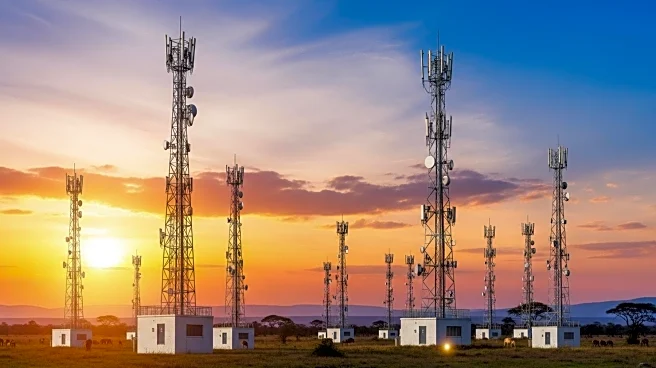What is the story about?
What's Happening?
African telecom operators are increasingly shifting their strategies to adapt to competitive pressures and changing market demands. Cell C, a South African operator, has transitioned to a fully outsourced network model, moving away from traditional infrastructure ownership. This shift is part of a broader trend where operators are exploring Infrastructure as a Service (IaaS) and Virtual RAN (VRAN) models to reduce capital expenditure and improve operational efficiency. The competitive landscape in South Africa, dominated by MTN, Vodacom, and Telkom, has prompted operators like Cell C to reassess their value propositions and explore new business models. The move towards infrastructure sharing and outsourcing is seen as a way to manage costs and remain competitive in a market with high consumer expectations and limited growth potential.
Why It's Important?
The shift towards infrastructure sharing and outsourcing in the African telecom sector is significant as it reflects broader global trends in the industry. By adopting models like VRAN, operators can potentially reduce costs associated with deploying new technologies such as 5G and 6G, which require substantial investment. This approach allows operators to focus on service delivery and customer experience rather than infrastructure management. The implications for the industry include increased reliance on a smaller number of infrastructure providers, which could affect competition and pricing. Additionally, the move may influence regulatory policies and market dynamics, as operators seek to balance cost efficiency with service quality. The success of these models could serve as a blueprint for other emerging markets facing similar challenges.
What's Next?
As African telecom operators continue to explore infrastructure sharing and outsourcing, several potential developments could unfold. Regulatory frameworks may need to adapt to accommodate new business models and ensure fair competition. Operators might also seek strategic partnerships with data center providers and cloud service companies to enhance their service offerings. The focus on consumer demand and enterprise solutions will likely drive innovation in service delivery, with operators leveraging technologies like AI to improve efficiency and customer experience. The ongoing evolution of the telecom sector in Africa will require operators to navigate complex regulatory, cultural, and technological landscapes to achieve sustainable growth.
Beyond the Headlines
The shift towards infrastructure sharing and outsourcing in the African telecom sector raises several ethical and cultural considerations. As operators rely more on external providers, issues related to data privacy and security may become more prominent. Additionally, the move could impact local employment and economic development, as traditional infrastructure roles may be reduced. The cultural diversity across African markets presents unique challenges in implementing standardized solutions, requiring operators to tailor their approaches to local needs and preferences. Long-term, the success of these strategies will depend on balancing cost efficiency with social responsibility and community engagement.


















